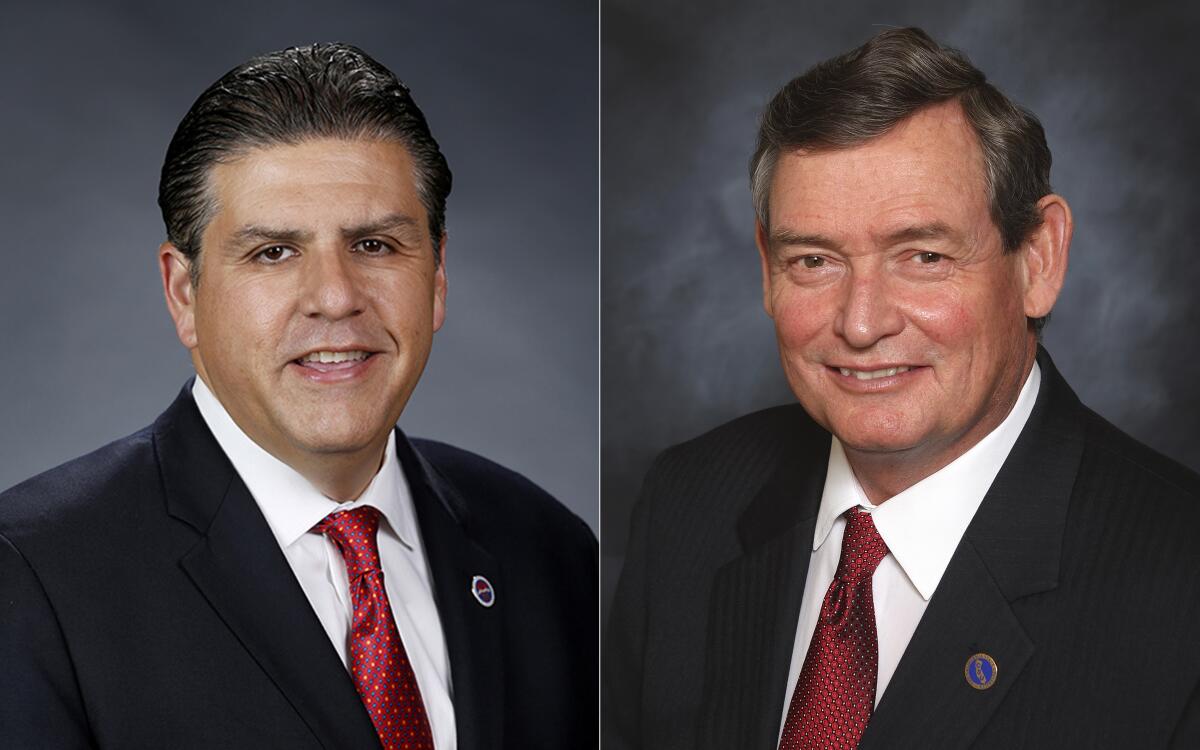CSU halts program that paid millions to executives after they departed

California State University will halt a program that has paid millions to executives who have resigned in recent years — including former Chancellor Joseph I. Castro — until the Board of Trustees reviews a task force’s recommendations.
The move Tuesday by the trustees follows a Times investigation that reported the system has paid more than $4 million to 11 top executives since 2015 with little accountability.
CSU has paid more than $4 million in salary and benefits to a small group of former executives including former Chancellor Joseph I. Castro, who resigned last month
Two of those executives, Castro and former San Jose State President Mary Papazian, left their posts under a cloud of scrutiny over their mishandling of sexual misconduct allegations.
Former Chancellor Timothy P. White is also benefiting from the program, receiving an annual salary of $327,744 for two years until the end of this year and a $24,000 car allowance during the period. White authorized a quiet settlement that allowed a former Fresno State vice president to leave with $260,000, retirement benefits and a glowing letter of recommendation, written by Castro, amid allegations of sexual harassment and workplace bullying, records show. Castro, while president of Fresno State, had hired the vice president and was forced to resign over how he handled alleged wrongdoing by the top administrator.
The payouts took place during a period when tuition was raised and students struggled under the burdens of the pandemic. Nearly half of the approximately 430,000 undergraduate students in the largest four-year public university system in the nation are Pell Grant recipients with exceptional financial needs, according to Cal State data.
“It is important to acknowledge that we are learning and that we hold ourselves accountable, and authentic accountability includes reform,” Board Chair Lillian Kimbell said.
The board’s discussion followed a tense public comment session, during which faculty, staff, students and others shared frustration over a breakdown in Title IX procedures and what was described as “sweetheart” deals for top officials who resigned under scrutiny.
“We will no longer allow the practices that have hidden, forgiven or forgotten ethical transgressions that reward predators with hundreds of thousands of taxpayers’ dollars in secret deals, severance agreements,” Cal State San Bernardino professor Nena Torrez said.
Other members of the California Faculty Assn. — the union that represents more than 29,000 CSU employees — called for reforms to the executive transition program and retreat-rights policies, which allow top administrators to become faculty members when they resign from their top positions.
“Over $400,000 for advice and wisdom from a chancellor who had to resign in disgrace, having served only one year in that role? ... The Board of Trustees needs to do better for our faculty, our students and our staff,” Fresno State professor Diane Blair said, referring to Castro’s resignation package.
The board’s announcement comes weeks after Castro abruptly resigned following outcry last month over his handling of sexual harassment, intimidation and workplace bullying allegations against former Vice President of Student Affairs Frank Lamas.
The allegations against Lamas began in 2014, but an investigation was not launched until 2019, following a formal Title IX complaint. Its findings showed “credible” evidence of wrongdoing and prompted the settlement agreement.
Three weeks after the Lamas settlement pact, Castro was named CSU chancellor. He previously told The Times he did not inform trustees about the investigation and settlement during the chancellor search, believing that White would have done so if he’d deemed it necessary.
Upon his resignation, in addition to the payout, Castro received a six-month housing allowance through the executive transition program, according to documents reviewed by The Times. The program has been in effect since 1981 and has undergone at least two state audits.
The task force review will be presented to the board in May, Kimbell said. The program’s suspension will affect newly hired employees.
The board, as previously reported, also directed the CSU to examine its policy on retreat rights and on issuing letters of recommendations.
Both policies were recently scrutinized in the context of the Lamas settlement. Officials said that because Lamas had retreat rights, the only way to completely sever him from the university system was through a settlement.
In an interview last week, Lamas disputed the findings of the investigation. He said he did nothing wrong and provided emails from top Cal State officials that commended him for his work during the period he was a vice president at Fresno State.
According to the emails, Lamas met with White at his office at Cal State headquarters in Long Beach in late October 2019. Lamas said White offered guidance on what he needed to do to become a president at one of the 23 system’s campuses. “I went there to try to soak up whatever wisdom I could get,” Lamas told The Times.
White could not be reached for comment.
The board also directed an independent external investigation into administrators’ response to Title IX complaints at Fresno State, which is expected to be completed within the next three to four months, and an assessment of Title IX policies at all 23 campuses.
The meeting marked the first time that trustees met in public since news about Castro’s handling of allegations, first reported by USA Today, roiled the system.
“We as a board were kept in the dark and not served well by recent events and our past chancellor,” board member Adam Day said. “We, with the facts today, are taking strong and decisive action to respond to this crisis.”
More to Read
Sign up for Essential California
The most important California stories and recommendations in your inbox every morning.
You may occasionally receive promotional content from the Los Angeles Times.













